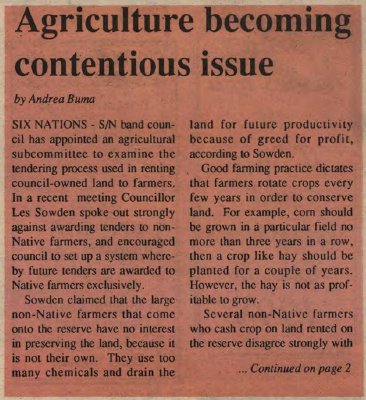"Agriculture becoming contentious issue"
- Publication
- Tekawennake News (Ohsweken, Ontario), 31 Dec 1997, pp.1-2
- Full Text
- Agriculture becoming contentious issueby Andrea Buma
SIX NATIONS - S/N band council has appointed an agricultural subcommittee to examine the tendering process used in renting council-owned land to farmers. In a recent meeting Councillor Les Sowden spoke out strongly against awarding tenders to non-Native farmers, and encouraged council to set up a system whereby future tenders are awarded to Native farmers exclusively.
Sowden claimed that the large non-Native farmers that come onto the reserve have no interest in preserving the land, because it is not their own. They use too many chemicals and drain the land for future productivity because of greed for profit, according to Sowden.
Good farming practice dictates that farmers rotate crops every few years in order to conserve land. For example, corn should be grown in a particular field no more than three years in a row, then a crop like hay should be planted for a couple of years. However, the hay is not as profitable to grow.
Several non-Native farmers who cash crop on land rented on the reserve disagree strongly with
(Continued on page 2)
Agricultural issue on Six Nations(Continued from front page)
the opinion expressed by Councillor Sowden. They say that they have a long-term interest in renting land on the reserve. The costs of planting a crop are astronomical, so they say no farmer would ruin the land and risk harvesting a poor crop. Some farmers invest $100,000 a year or more in planting. A source said "the cost of planting is the same whether you get a good crop or a bad one."Larry Powell, who rents privately-owned land on the reserve said that he "treats the land like my own." He emphatically stated that it doesn't matter where he's renting land, he takes good care of it so that it will produce well for him.
Art Porter, a large Native farmer, agreed that most of the big farmers operating on the reserve are farming properly. He said, "there is a right way and a wrong way in which to do things." Porter further stated that many of the non-Native farmers have been willing to help him in the past, sharing their knowledge of new practices and technologies. There have been abuses in the past, but those were mainly by small "fly-by-night" operators, who wanted to get in, make a profit, and get out quickly, according to Porter.
However, Porter says that the problem is that there has not been a level playing field for Native farmers for years. In the past they were unable to access capital. Because of regulations that prevented banks from repossessing equipment on the reserve, they were unwilling to lend money to Natives.
Recently, farm equipment dealers have begun to help Native farmers more with financing. With the cost of big equipment like tractors and combines well over $100,000, there is a distinct need for financing in the farming industry.
Porter says that they do not want to create any problems, just "to make a working environment for ourselves in our community." Porter is thrilled with the 500% increase in Native farming activity in the last few years, and is happy to see Natives once more farming their own land. He feels that council should award tenders to Natives to help them get a start.
It is likely that when tenders held by non-Natives start coming up for renewal, the land will be rented to Natives instead. Council is currently working on legislation to closely regulate the awarding of contracts.
It is unclear just how much land is owned by council, estimates given were in the 1500 acre range. However, council has lately been buying farms in Oneida along highway six, and also in Onondaga. Non-Native farmers are becoming upset at being denied the opportunity to bid for land that has been traditionally farmed by them.
Land on the reserve rents anywhere from $25-$100 acre depending on quality. It is hard for many smaller Native farmers to compete with the large farmers, according to Councillor Sowden.
Porter says that council would no doubt rent to non-Natives if the demand from Native farmers wasn't there. However, Porter feels there are enough Native farmers trying to get into the business. He reasons that they are the ones supporting the local community, so they should have first consideration.
- Creator
- Buma, Andrea, Author
- Media Type
- Text
- Newspaper
- Item Type
- Clippings
- Publisher
- Tekawennake News
- Place of Publication
- Six Nations of the Grand River, ON
- Date of Publication
- 31 Dec 1997
- Subject(s)
- Personal Name(s)
- Sowden, Les ; Powell, Larry ; Porter, Art.
- Corporate Name(s)
- Six Nations Elected Band Council.
- Local identifier
- SNPL005495v00d
- Language of Item
- English
- Geographic Coverage
-
-
Ontario, Canada
Latitude: 43.06681 Longitude: -80.11635
-
- Creative Commons licence
 [more details]
[more details]- Copyright Statement
- Public domain: Copyright has expired according to Canadian law. No restrictions on use.
- Copyright Date
- 1997
- Copyright Holder
- Tekawennake News
- Contact
- Six Nations Public LibraryEmail:info@snpl.ca
Website:
Agency street/mail address:1679 Chiefswood Rd
PO Box 149
Ohsweken, ON N0A 1M0
519-445-2954



